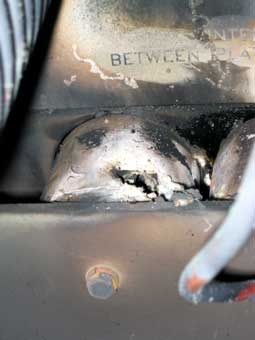
July’s column started with, “After the heatwave that ran through a large part of my territory through mid July, my thoughts have turned to cooling (ask me if I’m thinking of that in January and I can promise I’ll say no!).” I was right – after a couple of days of single digit temperatures, I can assure you that cooling is the last thing on my mind!
However, a related panicked message from my significant other, indicating that her car wouldn’t start, and the subsequent troubleshooting process, got me thinking – always a dangerous thing.
With the advent of higher efficiency transmitters, especially in AM broadcasting, a lot of folks are surprised to discover that sometimes it’s actually necessary to HEAT the transmitter room. This may seem counter-intuitive, but transmitters, like other electronics, have MINIMUM temperature ratings as well as maximums. This is for a couple of reasons:
- First is possibly the more obvious to anybody who drives in northern climates and has had to scrape the windshield in the morning – cold temperatures lead to condensation in the form of frost. When water vapor in the air condenses on electronics, that’s generally considered to be a bad thing. Thus the “non-condensing” caveat in temperature specifications… you might be able to start your transmitter after maintenance at an ambient temperature of zero degrees if the humidity is low, but if it’s higher, typically, things are not going to go well.
- Secondly – and this one was the direct result of the panicked message the other day – cold temperatures cause contraction. Different materials contract at different rates. If a lead terminal contracts more than the stainless hardware securing it, the resultant loose connection leads to intermittent operation (one quick half turn with a crescent wrench and the car mentioned above started like a charm).

Loose hardware is one of the common causes of cast mica capacitor failures (steel hardware, bonding aluminum or copper plates to brass terminals requires careful attention to torque specifications).
Frequently you’ll hear or read me commenting about the need for annual hardware checks. This is especially important for equipment that is run intermittently (such as a backup transmitter or a daytime AM station), but it applies to anything. Fan vibrations, temperature changes, normal compression of copper wire in compression terminals (such as circuit breakers or many AC mains connections), all of these can lead to loose connections over time. Loose connections in low current applications cause intermittent operation. Loose connections in higher voltage or current applications lead to heat, melted metal, arcing and various other messy off-air types of situations.
Especially where dissimilar metals are being connected (almost always the case), with different expansion/contraction characteristics, it’s critical to pay attention to manufacturer torque specifications when provided. It’s also a good idea to ask about these specifications if they are NOT provided – because a connection that is too tight can shear apart under heating, just as one that’s not tight enough can cause problems during cold weather.
In short, sometimes heat is a good thing – and if your transmitter site is in an area where temperatures can go down to (or below) freezing, it’s a good idea to have an auxiliary heat source in place, for those times when off-air maintenance is required, even when not needed during normal operation – it will ensure you are able to turn the rig on again! Also, hardware should be checked regularly (every year or two as a general rule). That will go a long way toward helping to get the most out of your transmitter – and help to cut down on calls to tech support!
Jeff
Jeff Welton, has worked with Nautel for 25+ years. He is currently the Nautel Sales Manager for U.S. Central Region but previously he spent 16.5 years as a Nautel Customer Service Technician.
Submissions for this Tips ‘n Tricks column are encouraged and if published you’ll receive a Nautel T-shirt. Submissions should be typed and emailed, with high resolution photos, to [email protected] using the subject line Tips ‘n Tricks.

